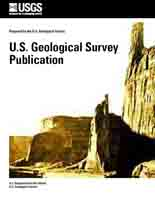Fifty-eight water analyses are reported for samples collected from 19 hot springs and their
overflow drainages and one ambient-temperature acid stream in Yellowstone National Park (YNP)
during 1996-98. These water samples were collected and analyzed as part of research investigations
on microbially mediated sulfur oxidation in stream waters and sulfur redox speciation in hot springs
in YNP and chemical changes in overflow drainages that affect major ions, redox species, and trace
elements. The research on sulfur redox speciation in hot springs is a collaboration with the State
University of New York at Stony Brook, Northern Arizona University, and the U.S. Geological
Survey (USGS). One ambient-temperature acidic stream system, Alluvium Creek and its tributaries
in Brimstone Basin, was studied in detail. Analyses were performed adjacent to the sampling site, in
an on-site mobile laboratory truck, or later in a USGS laboratory, depending on stability and
preservability of the constituent.
Water temperature, specific conductance, pH, Eh, dissolved oxygen (D.O.), and dissolved
H2S were determined on-site at the time of sampling. Alkalinity and F were determined within a few
days of sample collection by titration and by ion-selective electrode, respectively. Concentrations of
S2O3 and SxO6 were determined as soon as possible (minutes to hours later) by ion chromatography
(IC). Concentrations of Cl, SO4, and Br were determined by IC within a few days of sample
collection. Concentrations of Fe(II) and Fe(total) were determined by ultraviolet/visible
spectrophotometry within a few days of sample collection. Densities were determined later in the
USGS laboratory. Concentrations of Li, Na, and K were determined by flame atomic absorption (Li)
and emission (Na, K) spectrometry. Concentrations of Al, As(total), B, Ba, Be, Ca, Cd, Co, Cr, Cu,
Fe(total), Mg, Mn, Ni, Pb, Si, Sr, V, and Zn were determined by inductively-coupled plasma optical
emission spectrometry. Trace concentrations of Cd, Se, As(total), Ni, and Pb were determined by
Zeeman-corrected graphite-furnace atomic-absorption spectrometry. Trace concentrations of
As(total) and As(III) were determined by hydride generation using a flow-injection analysis system.


